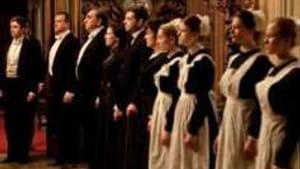Stay in the Loop
BSR publishes on a weekly schedule, with an email newsletter every Wednesday and Thursday morning. There’s no paywall, and subscribing is always free.
It seemed like a good job, considering the alternatives
Where have all the servants gone?

The income gap between rich and poor has widened astronomically in the past half century, according to a study by George Washington University, but the gap between the rich and the middle class has widened even more. (Click here.) Yet today's disparity between haves and have-nots is nothing like that of the 19th and early 20th Centuries.
TV programs like "Downton Abbey" and "Upstairs Downstairs" remind us of the huge gulf that once existed between master and servant. In the "bustling subterranean township" that was the servants' domain in the homes of the wealthy, scores of servers waited upon the served. The Duke of Devonshire needed 200 servants to look after the needs of a house party of 50.
And they were eminently affordable. Cheap labor made large staffs possible. In the hierarchy that existed below stairs, the highest ranking official servant, the Butler, earned between $4,000 and $6,000 a year; next in line was the housekeeper, who earned between $4,000 and $5,000 in today's currency.
To be sure, their compensation included perks like free food and accommodation. And unless the servants were caught with their hands in the till or discovered in a colleague's (or, worse, the squire's) bed, they enjoyed job security.
Humble and obedient
But life was hard and the strictures demanding. Servants were often required to wear non-creaking shoes, or to make themselves invisible when the lords and ladies of the manor passed by. Some of their duties were frivolous, such as being asked to iron the morning newspaper or to make sure that the yolks of eggs were properly centered on the plate.
The upper and middle classes typically concluded their letters by signing off with "Your humble and obedient servant" (generally rendered as "y'r h'mble and obd'nt ser'vnt"). But it was the denizens of the downstairs who had to display constant humility and obedience. Their jobs involved much bowing and scraping and forelock tugging in the presence of the upper crust.
Dog walkers and party planners
But big changes came with the advent of World War I, when many servants escaped the drudgery of the manor for military service, factory work or postal duties. Then, between the wars, "service" was revived. But with World War II, not only did domestic service decline; it was also followed by two forces that eroded it still further: a growing egalitarianism, and the postwar introduction of such labor-saving devices as refrigerators, vacuum cleaners and dishwashers.
Today, servants have largely been replaced by services. The better off can afford to employ nannies or au pairs, contract cooks and dog walkers, party planners and babysitters. And you can still find a tiny vestige of at least the upper echelons of the downstairs pecking order: A butler and valet school recently opened in London, catering to the needs of the nouveaux riche and Britain's dwindling aristocracy.
Almost certainly, the era of P.G. Wodehouse's Jeeves, or of the butlers Hudson in "Upstairs Downstairs," Carson in "Downton Abbey," or the scatologically fictitious "Old Scrotum, our wrinkled retainer" has gone forever.
Curious, isn't it, how the relative classlessness of our century has rendered servants pretty much obsolete without apparently narrowing the chasm that separates rich from poor?
TV programs like "Downton Abbey" and "Upstairs Downstairs" remind us of the huge gulf that once existed between master and servant. In the "bustling subterranean township" that was the servants' domain in the homes of the wealthy, scores of servers waited upon the served. The Duke of Devonshire needed 200 servants to look after the needs of a house party of 50.
And they were eminently affordable. Cheap labor made large staffs possible. In the hierarchy that existed below stairs, the highest ranking official servant, the Butler, earned between $4,000 and $6,000 a year; next in line was the housekeeper, who earned between $4,000 and $5,000 in today's currency.
To be sure, their compensation included perks like free food and accommodation. And unless the servants were caught with their hands in the till or discovered in a colleague's (or, worse, the squire's) bed, they enjoyed job security.
Humble and obedient
But life was hard and the strictures demanding. Servants were often required to wear non-creaking shoes, or to make themselves invisible when the lords and ladies of the manor passed by. Some of their duties were frivolous, such as being asked to iron the morning newspaper or to make sure that the yolks of eggs were properly centered on the plate.
The upper and middle classes typically concluded their letters by signing off with "Your humble and obedient servant" (generally rendered as "y'r h'mble and obd'nt ser'vnt"). But it was the denizens of the downstairs who had to display constant humility and obedience. Their jobs involved much bowing and scraping and forelock tugging in the presence of the upper crust.
Dog walkers and party planners
But big changes came with the advent of World War I, when many servants escaped the drudgery of the manor for military service, factory work or postal duties. Then, between the wars, "service" was revived. But with World War II, not only did domestic service decline; it was also followed by two forces that eroded it still further: a growing egalitarianism, and the postwar introduction of such labor-saving devices as refrigerators, vacuum cleaners and dishwashers.
Today, servants have largely been replaced by services. The better off can afford to employ nannies or au pairs, contract cooks and dog walkers, party planners and babysitters. And you can still find a tiny vestige of at least the upper echelons of the downstairs pecking order: A butler and valet school recently opened in London, catering to the needs of the nouveaux riche and Britain's dwindling aristocracy.
Almost certainly, the era of P.G. Wodehouse's Jeeves, or of the butlers Hudson in "Upstairs Downstairs," Carson in "Downton Abbey," or the scatologically fictitious "Old Scrotum, our wrinkled retainer" has gone forever.
Curious, isn't it, how the relative classlessness of our century has rendered servants pretty much obsolete without apparently narrowing the chasm that separates rich from poor?
Sign up for our newsletter
All of the week's new articles, all in one place. Sign up for the free weekly BSR newsletters, and don't miss a conversation.

 David Woods
David Woods